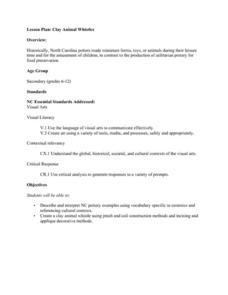PBS
Hands-On Engineering Challenges to Bolster Your Electricity, Sound, and Force Units
Need some activities to go along with your unit? A collection of hands-on activities from PBS offers opportunities to add to your electricity, sound, and force units. The electricity activities revolve around building a...
Curated OER
Reflection and Refraction
What is a prism? A place for light waves that commit minor refractions! The thorough resource includes three hands-on investigations covering light reflection and refraction; mirrors, lenses, and images; and optical systems. Subject...
Curated OER
Rocks and Minerals
Take young geologists on an exploration of the collection of rocks and minerals that we call Earth with an upper-elementary science lesson. Through a series of class discussion and hands-on investigations, students learn about the...
It's About Time
Concentrating on Collisions
How important is momentum? Pupils investigate and apply the definition of momentum as they conduct analyses during a series of one-dimensional collisions. They infer the relative masses of two objects by carefully staging and predicting...
Center for Learning in Action
Water – Changing States (Part 2)
Here is part two of a two-part lesson in which scholars investigate the changing states of water—liquid, solid, and gas—and how energy from heat changes its molecules. With grand conversation, two demonstrations, and one hands-on...
Center for Learning in Action
Gases
Explore the properties of gases through one activity and two investigations in which super scientists observe the changes gas makes when encountering different conditions.
Will Steger Foundation
The Carbon Cycle - What are its Implications for Climate Policy?
The carbon cycle isn't a bike which produces carbon and this lesson explains why. Through reading and discussion, groups of pupils create visual explanations of the four parts of the carbon dioxide oxygen cycle. Activities...
Cooking Matters
Cooking Matters: For Chefs and Kids
Get your scholars cooking with a collection of activities that pairs the class to a community chef, promotes healthy snacking and drinking, and explores fruits and vegetables. Lower elementary learners...
Lee County High School
Clay Animal Whistles
Investigate North Carolina pottery history by creating clay animal whistles, a traditional leisure activity in the region. They research a particular animal and jot down its attributes to include in their project. Find step-by-step...
Berkshire Museum
Backyard Rocks
You don't have to travel far to learn about rocks, just step outside, pick up a stone, and begin investigating. After taking a class walk around the school grounds collecting rocks, young scientists practice their skills of observation...
It's About Time
Volcanic Hazards: Airborne Debris
Pupils interpret maps and graph data related to volcanic ash. Then they analyze the importance of wind speed and the dangers of the ash to both life, air temperature, and technology.
It's About Time
Volcanic History of Your Community
Did you know there are 20 volcanoes erupting at any given time? Pupils look at various igneous rocks, read local geologic maps, and determine if their area has a history of volcanic activity. A reading passage and analysis questions...
It's About Time
Elements and Compounds
Young scientists use electrolysis to separate water into its elements before experimenting with fire to learn about their properties. A helpful resource provides a reading passage and analysis questions.
Teach Engineering
Maximum Power Point
Investigate the maximum power output of a photovoltaic panel with a lesson that introduces the class to the maximum power point. Individuals learn how to determine the maximum power point of a solar panel by using Ohm's law and the power...
It's About Time
Energy Flow in Ecosystems
Emerging biochemists more fully understand the flow of energy in ecosystems as they explore the laws of thermodynamics and relate them to energy transfer in food chains. They also investigate heat loss from the human body and how...
Amazon Web Services
Idiom Dictionary
Examining idioms is a peace of cake when using this graphic organizer! Here, grammarians identify an idiom and use it in a sentence. Then they investigate its literal meaning versus its figurative meaning, and accompany each one with a...
Curated OER
Corporal Punishment
Nineteen states legally permit school officials to physically punish children. Scholars learn more about the topic as they use the website to prepare for a class debate or discussion. Pupils read background information and discover the...
National Clearinghouse for English Language Acquisition
Building Vocabulary: Prefixes, Roots, and Suffixes
Word roots, prefixes, and suffixes can hold the key to determining the meaning of a host of different words. Included here are five pages of prefixes, roots, and suffixes paired with their meanings and example words.
Curated OER
Fearless Fables: Wee Little Chick And the Magic Apron
In this reading worksheet, students investigate the fable form of storytelling by reading a 3 page fable about a chick who is being bullied. There are no questions on this worksheet.
Optical Society
Optical Society of America: Optics for Kids: Lenses and Geometrical Optics
Article explaining what lenses are and how they work. At the end of the article, there are links to several hands-on activities for investigating lenses.
Duke University
Duke University Libraries: Finding Primary Sources
Finding primary sources can be difficult and confusing at times. This site provides a list of history databases, rare books and manuscripts, and research guides for those looking for primary resources such as diaries, letters,...




















